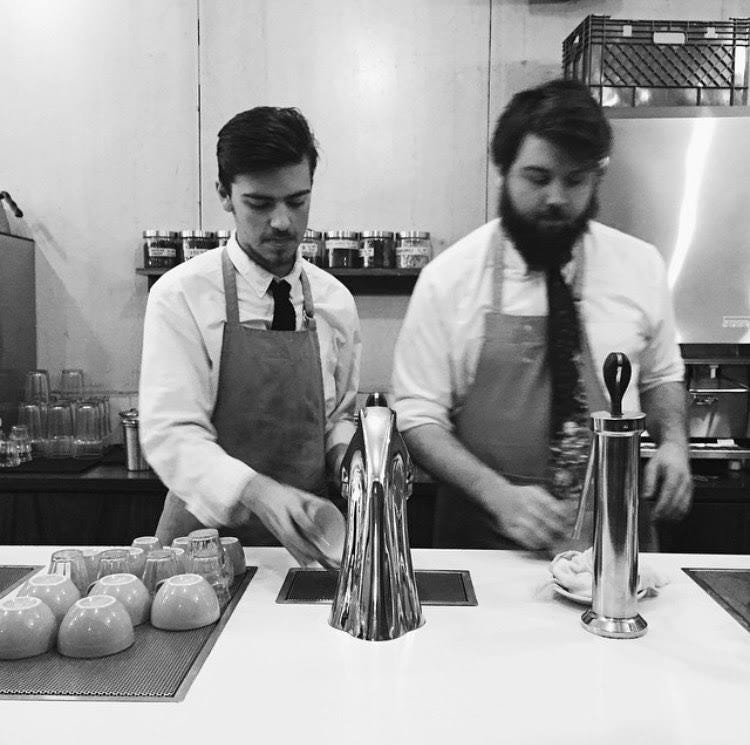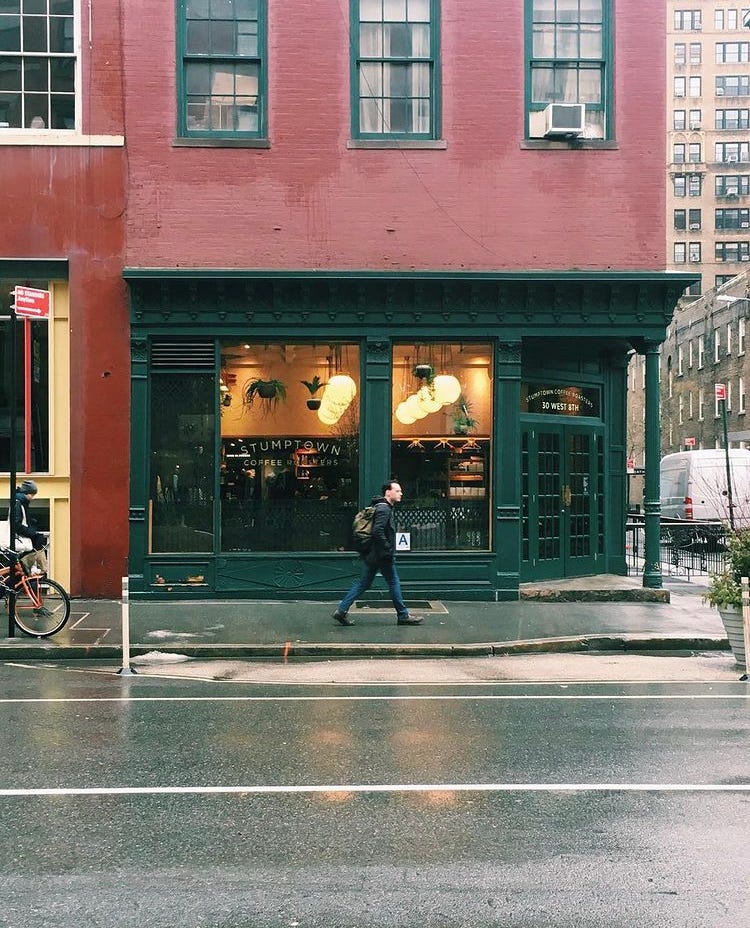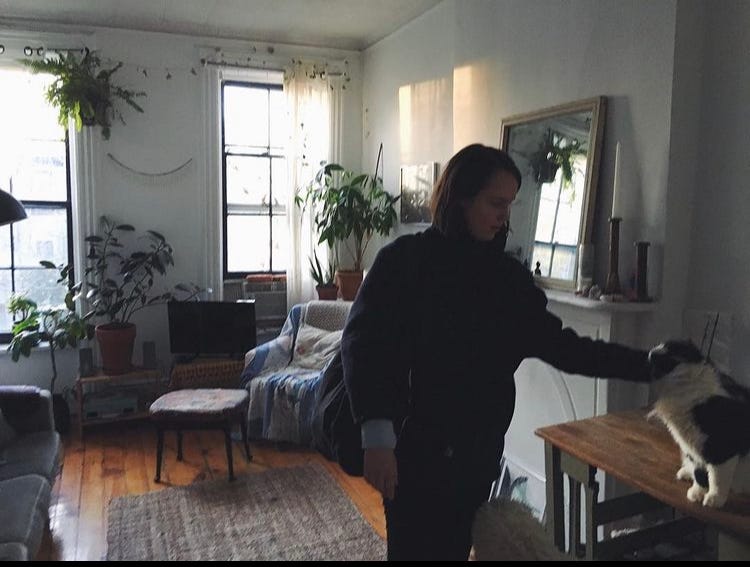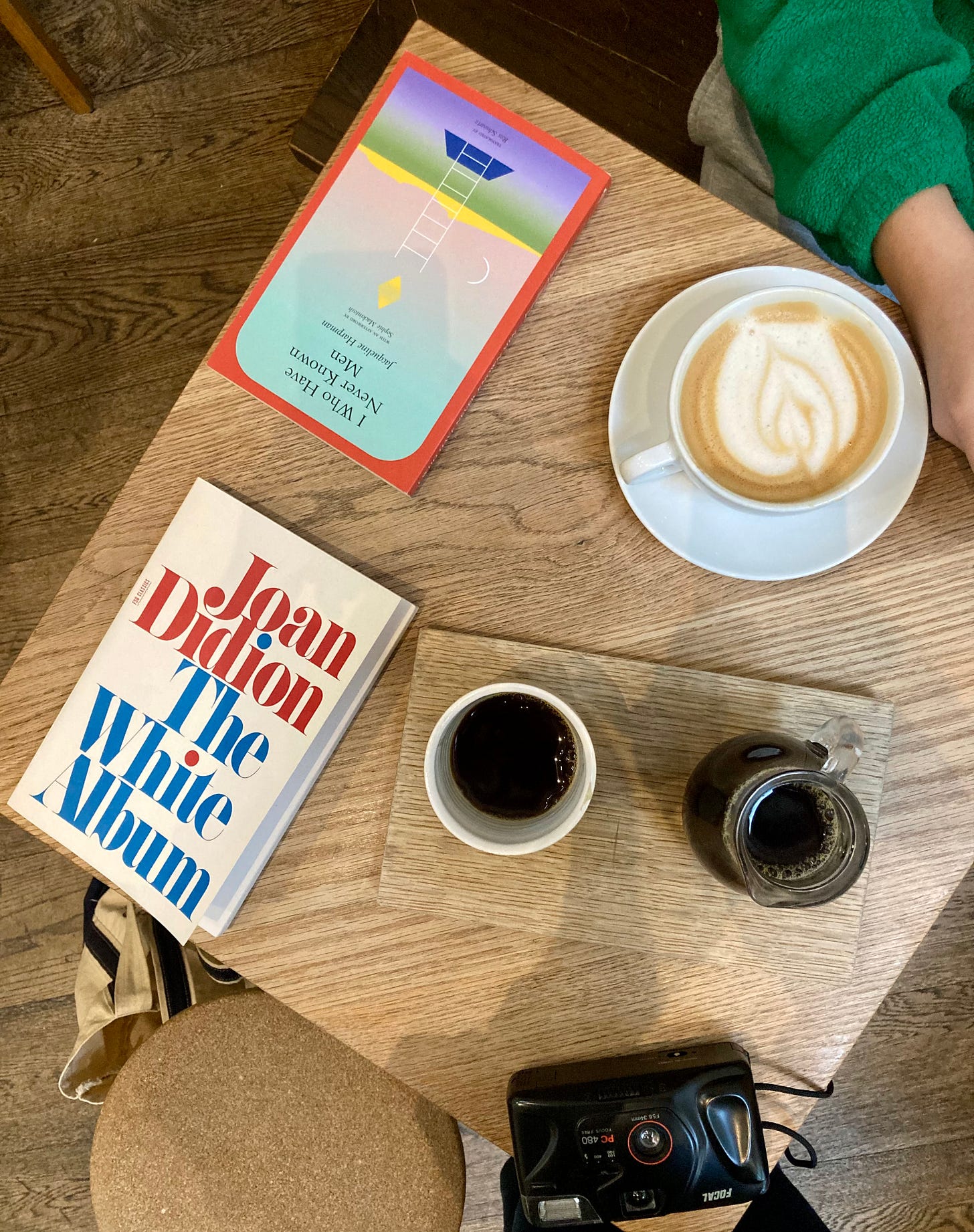How We Learn Cities
Noticing in New York, San Francisco, and Sacramento
When you visit a place for the first time, you try to notice everything at once. I recently went to San Francisco for the first time. I tried to take in the city layout as quickly as I could, though three days isn't quite enough. Tessa and I drove our rented Mini Cooper back to our hotel without the map going. After short panic (we only had one hour until dinner) we drove towards all the buildings and found it. When I am somewhere new, I try to remember what it was like the first time I came to another place, one that is now familiar to me. I remember my first time in New York City as an adult (near adult). My grandma took my cousin Zeke and me when we were in high school once, we were sixteen and seventeen I think. She also took my brother and I around that same time, maybe even the winter before. I'd been to New York once prior to those trips, but I was nine or ten and my skills of perception weren't turned on yet. Of course I still remember things. We went and saw the Imagine tribute to John Lennon in the park in the rain. My youngest brother got pushed around in a blue stroller with giant rubber wheels. I remember the jacket and hat I wore the entire trip (from Abercrombie & Fitch, and American Eagle respectively). We ate below the New Yorker hotel. Many of us got sick with some seasonal bug, but I was spared. I remember being paranoid about that sort of thing even then. I am still a bit of a hypochondriac. And I remember the little purplish blue digital camera I carried with me, that I had just received the week before as a Christmas present. I snapped a couple dozen photos of Times Square, Central Park (the Imagine memorial too), Radio City Music Hall and Rockefeller, hot dog carts, a hodgepodge of lingering Christmas decorations, and random store fronts and buildings. I remember taking one photo of an Aldo store, because that was also the last name of the girl I had a crush on at the time. I was a young Beatles fan, so seeing the Imagine memorial and that photo of Aldo may be the only two examples of how I saw New York through my own lens on that first trip. Everything else about the trip was the tourist as usual experience of ingesting large fragments of a place without trying to filter it down using the things about yourself that the city might contain. Seeing a place like this feels impersonal. You think that the people who live there must be totally separate from you, with foreign hobbies and interests. And it almost feels like there is an immovable film between you and the place that you watch from the sidewalk or from up on the double decker bus. At times there is. A taxi or hotel window, separating you from the strange habitat you watch.
On those later trips as I approached "adulthood", I approached the city more "seriously". I was trying to imagine moving there, and as that decision was only a year or so away, it was easy to take seriously. And so I saw the city through my lens of interests and hobbies, and a more fully formed personality. This time we stayed in the East Village instead of Times Square. We stayed in a garden apartment instead of a hotel. We took the train instead of taxis. I sought out the Village (carefully practicing the pronunciation of "Greenwich"), visited Cafe Wha? and Washington Square Park as a fan of Ginsberg and Dylan, and when we walked around Columbia I was thinking of Kerouac. We looked for parts of ourselves that were there, instead of simply getting lost amongst all that concrete and must see lists.
We came with a list of coffee shops we wanted to investigate. We were baristas in the suburbs of Atlanta. I chatted with the Stumptown baristas in the W. 8th Street brew bar. What was it like living there? How good was the coffee scene? And other stuff like that.
When I did move there at eighteen, I got a job at a superb coffee shop called Little Collins in Midtown (after a brief and hellish two weeks as an Eataly barista). My first day at Little Collins I was waiting to be introduced to the person who'd be training me, and that same barista from Stumptown who told me moving to New York was worth it came walking out from the back (hey John). He was still roommates with the other Stumptown barista too (Jen I think?), and I would later go to a holiday party at their apartment. When Zeke joined us in New York a year later, he took a job at a shop in the West Village called Cha Lait, and John Shin was the one who trained him there too (he'd left Little Collins a few months prior to help start Cha Lait).
Coffee was a way we processed the geography of the city on those early visits. We checked out Third Rail, both Stumptown locations, Boxkite, Variety, Everyman Espresso, and countless others. It is how we remembered different neighborhoods and different vibes around town, how we learned what the hell the 3 train did. Later while living in New York, my first few times out to Brooklyn were, of course, in pursuit of coffee. The first time was after my friend Mitchell recommended I visit a shop called Budin, because they had the Mod Bar which was a pretty novel espresso machine at the time. My second time was with a few coworkers from Little Collins. We did a "coffee crawl" in a snow covered Williamsburg and got extremely espresso'd at places like Devocion. Willy led us through the cold wind and easy inches of snow, remarking that he "knew Brooklyn well". I definitely didn't yet. It seemed to be an endless and quaint town square. I hadn't yet heard of, let alone been to, the places beyond that I soon would: Bushwick (roommate Matthew), Brownsville (a coworker and cycling enthusiast Jay), Bed-Stuy (Taeil and DJ, and Andi), Clinton Hill (an Airbnb to "test living in Brooklyn"), Greenpoint (Alan Palomo + Rostam Batmanglij), Gowanus (a NYU Urban Design Professor), or Red Hook (Mary Ellen, a friend and exquisite chef who Tessa worked with).
Eventually all of these places faded from novel to ordinary. What became remarkable about them was how different my initial perceptions of them had been. Bushwick became the land of Sunrise Sunset or Brooklyn Whiskers, Bed-Stuy was Stonefruit or 911 Bedford Ave where David rented us an apartment or the leaning home presided over by the weirdo Ledge, Greenpoint was where we worked at A/D/O and ate vegan pizza at Paulie Gees. A coffee shop that felt like hell to get to back on those first visits, was in reality just one quick transfer away. It's a bit like driving around a place at night, and then seeing it in the morning light with fresh eyes.
Last week, Tessa and I went to San Francisco with another coffee list at the ready. Saint Frank, Sightglass, The Coffee Movement, The Mill / Four Barrel, Coffee Shop... Coffee is still how we process new places. I have never stopped approaching new cities in this way. While in San Francisco, Tessa said that we are good at visiting new cities, that we know how to find our spots. She is right, we both travel like this. And together we usually have a pretty good itinerary of cool things worth checking out and we quickly feel "at home" with a strange variation on our beloved routines. Although my affection for Allen Ginsberg and Jack Kerouac is not as bright as it was at seventeen, I still included on our list the idea to stop by City Lights and see the tributes to the late poet and bookshop owner, Lawrence Ferlinghetti. We browsed the shelves. It wasn't that crowded. Tessa remarked on the noticeably heavy curation of their books. I decided to get a copy of Joan Didion's The White Album since I've been wanting to read it and I like doing things at the right time when things align that way (for example, when flying over England and spending a brief layover in Heathrow, I exclusively listened to British Rock). The White Album is almost entirely about California. I thought about buying Slouching Towards Bethlehem, but the disillusionment of The White Album felt more "of the moment". Tessa complemented the green hat the woman who rang us up was wearing, and then she noticed the green things we were wearing and joked "we all must have got the green memo." We left the bookshop and walked around looking for a good place to read our new books.
I was immediately struck by how Joan Didion digested places. By her ability to notice things and dissect new cities, people, or things happening in the country. I couldn't help but compare her talent for noticing to how I was taking in this new place. She is perceptive and her thinking is sharp and quick. She is critical (of San Francisco State College student protests, the “women’s movement”, meandering musicians, the Governor’s Mansion, the LA office of the California Dept. of Transportation) and yet also unafraid of being a fan (of the California State Water Project, The Getty Museum, Georgia O’Keeffe).
I've been thinking about the art of noticing for a while now, both in anticipation of my first trip to California and because I've been reading more (isn’t good writing good noticing?). I've been reading a lot of Stephen King, and he notices things well too. The ways his characters talk and think, and the places they go and objects they interact with, are all extremely real. They don't look for Ibuprofen, they look for Advil. They don't drive "a red car", they drive a red Plymouth Fury. They don't listen to the radio, they listen to Jerry Lee Lewis' Great Balls of Fire. I was listening to an interview with King recently and he remarked on how fiction writers didn't used to do this as much (and many still don't), that he kind of led the charge of using real brands, products, and media in books. I am not sure if that is right, but it is one of the first things you notice when reading his work. His stories feel very real even when they stretch into the unreal, because his characters live in the same world as you do, with the same advertisements, music, celebrities and television (at least if you're an American).
I've also been thinking about that scene in Reservoir Dogs where the crew is trying to collect tips from everyone for the diner bill and the famous discussion on tipping that follows. I used to think that scene was annoying. That discussion about whether or not tipping is the right way to pay service industry folks felt tired (“Yes, I know that in Europe they don’t tip.”). As a former barista, my position was clear. But I've come to see that scene as brilliant, specifically because of how ordinary and common that tipping debate is. To capture the ordinary so true is talent. How many of today's topical conversations will fade? How many will endure?
I've been thinking about these things because I've dusted off some old unfinished short stories and started some new ones too. When I write fiction, I often feel like an alien who has never had a human conversation or experience. Because of this I've started trying to deliberately take notice of everyday things, as if I were visiting my own routines for the first time. I am looking up references to trees in a Borges story (Poplar) instead of moving on and just picturing some tree lining the driveway described. I've started collecting examples of conversations that I keep having that I usually would consider unremarkable or have had dozens of times before. And I've started trying to capture what I notice in my own writing and photography. Instead of cutting the Ukrainian flag out of the frame when I go to take a photo of the sinusoidal San Francisco streets, I keep it in. Because this is a year where many Americans have purchased and started flying the Ukrainian flag, because this is the year Russia invaded Ukraine. And I want to notice that when I review these photographs years later. I've started taking photos of my desk at home for this reason too. Things that feel permanent will dissolve eventually into the softer hues of memory, and I want to capture the sharper specifics of my surroundings while I am still in them. Like my favorite pen right now that I picked up from Take Heart here in Austin or the copy of Secrets of Spectacular Chess that my sister's boyfriend Jack lent me earlier this year.
As we drove from San Francisco to Sacramento I looked out the window and tried to notice things I saw that I hadn't seen before. Or things I had stopped seeing after seeing them so many times. We passed by some Poplar trees. We drove over the American River where the first Americans discovered gold according to Joan Didion. I watched a "Let's Go Brandon" flag fly limply at a Strawberry farm. We talked about Tik Toks we'd seen recently, Van Life and remote work, gendered pronouns and colors, how unaffordable the Zillow listings are, the worst Hard Seltzers sweeping grocery store aisles, The Bear and The Rehearsal.
Though our first impressions of a new city, person or phase of life sharpen into clearer understanding over time, eventually we lose the defined edges and colors we grow accustom to in the present. The specifics smudge into softer vague recollection. The last names of people we saw everyday fall away from the first names. We mix up the cross streets of the bagel shop we stopped by every Tuesday before class. The possessions, people, and conversations we live alongside without much notice are forgotten. I lived in New York for five years, but now having been gone for three, the clear picture I'd developed is already fading. Never back to the blurriness of those early trips, but still it loses the sharpness only found when truly in it. But I have these photographs and memories of streets, coworkers and friends, coffee shops and train stops.
And of course, the reminder to take notice.












